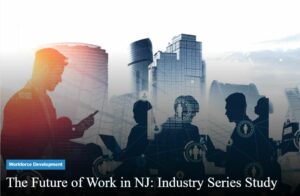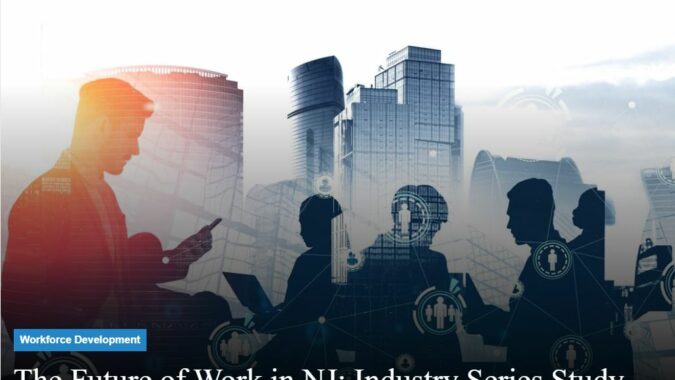 Focus NJ today released the second part of its Future of Work in NJ series, identifying the changing dynamics, opportunities, challenges, emerging skill sets and solutions to fulfill future employment in Education, Professional & Business Services and Trade, Transportation & Utilities.
Focus NJ today released the second part of its Future of Work in NJ series, identifying the changing dynamics, opportunities, challenges, emerging skill sets and solutions to fulfill future employment in Education, Professional & Business Services and Trade, Transportation & Utilities.
“The Future of Work in NJ: Industry Series Study” is a continuing set of industry reports issued by Focus NJ based on information provided by 250 New Jersey business executives and industry leaders through focus groups, online surveys, and personal communication.
“While each of the industries in this round have their own set of unique challenges and opportunities, there are certainly constants to be found within the solutions for all of them,” said Focus NJ Executive Director Nicole Sandelier.
“According to our respondents, the integration and continued embracing of emerging technologies, as well as more targeted and newer approaches to education, will better prepare the future workforce pipeline in all three of these industries.”
The Future of Work in NJ series first launched in August, with reports on Construction, Health Services, Information Technology and Manufacturing.
Key findings among the latest industry reports include:
Education (K-12 and Postsecondary)
- The adoption of new technology in everyday life is requiring teachers to take on more sophisticated duties and responsibilities in the classroom.
- The continued integration of new technologies in K-12 education is requiring teachers to have a better understanding and use of student data.
- With an increased focus on students’ psychological and emotional health, teachers are taking a more holistic approach to educating their students.
- Industry opportunities can be found with the adoption of virtual teaching of students; improvement of data systems to enhance student tracking; and articulation agreements between high schools, community colleges, and four-year institutions to assist with the affordability of continued education.
- Challenges include a lack of educator diversity; perception of systemic devaluation of K-12 educators; and inadequate use of financial resources in school districts.
- Recommendations to improve K-12 education include the reintroduction of trade skill sets; a shift away from teaching toward standardized tests; and guiding students to next education steps that are right for them, even if their path is not to a four-year institution.
Postsecondary
- The integration of technology in higher education provides unique opportunities for postsecondary institutions to engage with students unlike before.
- With a broad incorporation of online coursework, however, New Jersey’s institutions are experiencing increased competition from institutions in other states.
- Increased collaboration and partnerships among K-12s, 2-year institutions, 4-year institutions, business and industry represent a positive opportunity for postsecondary education.
- There are challenges in the form of an aging workforce; lack of qualified workers; a decreasing number of high school graduates; and the continued migration of New Jersey students to out-of-state higher education institutions.
- Improvements can be made with the creation of more paid, experiential learning opportunities for college students and the adoption of policies that embrace societal shifts associated with the next-generation workforce (i.e., work-life balance).
Professional & Business Services
- COVID-19 has forced small- and mid-size professional and business services to rapidly adapt to a digital transformation.
- Advancement in technologies and platforms is allowing the industry to expand products and services to provide added value to clientele.
- There is a growing focus on data analytics to identify process improvements to enhance efficiency.
- Challenges in the industry include the fact that these services are often the first expenses to be cut during economic downturns; constantly changing software and new technologies make modernization difficult to manage; and out-of-state companies can provide the same or similar services at cheaper costs, while New Jersey’s bureaucracy, regulations, and excessive fees are often burdensome.
- Solutions include changing the societal misconception that a four-year degree is needed to have a successful career; promoting the key role that certificates and credentials play in preparing workers for careers in the industry; and incorporating certificates and credentialing into degree programs so students can gain documented and industry-desired skill sets.
Trade, Transportation & Utilities
- Technological advancements are causing global shifts in value chains, including an increased reliance on regional chains as opposed to global chains.
- The industry is making a concerted effort to decrease its carbon footprint.
- Given New Jersey’s centralized location – with proximity to the Port of NY/NJ and Newark Liberty Airport – supply is consistently high.
- The future of the industry will rely heavily on the digital economy. As a result, jobs in this industry will be high-skill, high-paying jobs.
- The integration of technology and artificial intelligence, such as robotics, is allowing for increased productivity.
- Challenges in the industry include an aging workforce with a lack of young, skilled labor; maintenance of security and privacy of sensitive information; the costly nature of New Jersey’s business climate, especially planned minimum wage increases; and the increasing cost of energy due to decarbonization.
- Some improvements in the industry include promotion of the role certificates and credentials play in preparing workers for careers in the industry; the creation of apprenticeships for lower-skilled jobs; and promotion of them as viable ways to earn and learn.
To view the complete “Future of Work in NJ: Industry Series Study,” click here. More industry studies under the Future of Work in NJ banner are expected next year, including a new, COVID-19 economic impact report on the Leisure & Hospitality industry.
Focus NJ – the Center for Economic Research and Workforce Solutions – is a nonpartisan, nonprofit research foundation launched by the New Jersey Business & Industry Association in February 2020. It provides deep analysis of public policies, industry trends and economic indicators that impact New Jersey’s overall affordability, workforce and competitiveness.

